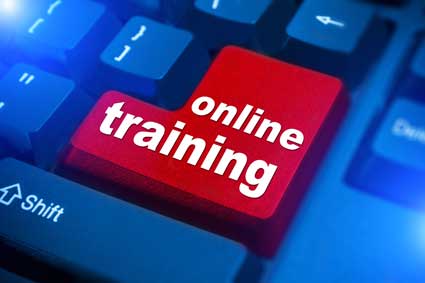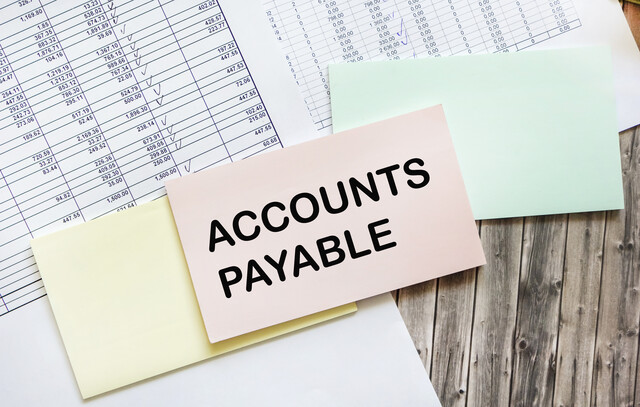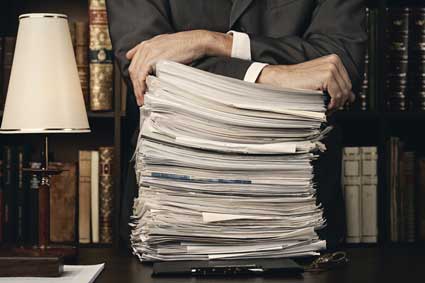Introduction
Speaking with clients is a common part of a legal secretary's duties. While the receptionist of larger or medium-sized firms may be the first person a client or visitor meets, the secretary is nearly always the liaison between the attorney and client. In many cases, you will find yourself in direct contact with the client quite often, particularly when it comes to relaying messages, sending paperwork, having the client provide required information, and scheduling appointments. On some cases, you may even have more contact with a client than your attorney does, especially after he or she has finished an initial consultation.
You must be comfortable dealing with people, and you also must know how to deal with difficult or irate people. Many of your boss's clients will be stressed because of a potentially life-altering legal situation; therefore, you always must keep in mind that discretion and understanding is key in helping clients feel at ease. While you may encounter sticky situations, keep in mind that the three most important skills you must have are a neutral attitude, the ability to mediate well, and common sense. If neutrality and mediation escape you, then rely on your common sense. The fact is that no matter what the legal issue or your opinion concerning it or the client personally, you must not make your opinion known. You must consistently maintain a non-biased attitude. In some situations this may be difficult, such as in cases of a criminal nature; however, you must remember that the entire basis of the American justice system is the concept that defendants are "innocent until proven guilty." As one who assists an attorney in defending those accused of criminal acts, your first priority is the client's needs.
Wherever possible, answer clients' questions calmly and patiently. Explain why they were billed the way they were, assure them that their case is indeed being handled professionally, or tell them why the attorney cannot speak with them at the present moment. If you do not know the answer to a question, tell them you will find out the answer and call them back, and make sure you do just that. If you build trust with your attorney's clients, they will be much easier to work with in the future. Most people become angry precisely because they are not getting answers to their questions. Once you have provided them with satisfactory explanations, these folks will relax and go about their business. Other clients are just difficult in general and are demanding by nature.
You will have to learn to deal with all personality types without making matters worse, so simply stay calm and try to give them what they need. In all cases, you should involve your attorney only when absolutely necessary and after you have exhausted all other options.
Two last points to keep in mind: 1) in situations where specific legal advice is required, you should have your attorney contact the client rather than offer legal advice, no matter how much you actually know about the case; and 2) if a client becomes violent or verbally abusive, you should end the communication immediately and, if necessary, contact the police.
You should treat all visitors to your office and callers you do not know with courtesy and be as polite to them as you are with clients. Do not allow your personal mood or problems to interfere with the way you communicate with anyone in the business environment. You should first find out what the visit or phone call is about, then do your best to accommodate the person's needs. The practice of law is like any other business; any visitors may be potential clients, and if treated poorly, they may be inclined to take their business elsewhere. It does not matter if the visitor to your office is a retired judge or a postal carrier picking up the mail, each individual should be treated with respect.
Sometimes a paralegal or clerk will take on meal duty, and other times it will be your job. Legal firms are teams. If you are part of the team, you will have to do your fair share of the grunt work; besides, the person ordering the food often gets to pick the restaurant, so it is not all bad! The bottom line is this: When outsiders visit your office, treat them with the same courtesy you would want if you were visiting their office.
Do not underestimate the effect proper phone etiquette can have when communicating with others. Below are seven incoming and seven outgoing phone tips that will help you communicate efficiently when answering and receiving business calls.
1. Calls should be answered promptly.
2. The phone should be answered consistently with a standard greeting; for example, you could say, "Flynn and O'Donnell, this is Mary speaking, may I help you?" or "Jack Flynn's office, this is Mary, may I help you?" If the firm name is too long to state when answering the phone, which is often the case, simply state the name of the attorney(s) you work for, then your name and "may I help you?" The caller wants to be assured that they have reached the correct office and with whom they are speaking, so be sure to do this at all times.
3. Avoid putting callers on hold unless absolutely necessary. If they are going to be waiting longer than a few minutes, tell them this and give them the option of waiting, calling back, or having your attorney call them back when he or she is free. While they are on hold, check back with them periodically and let them know what the status of the wait is.
4. Always speak clearly, concisely, and with confidence.
5. Speak at an appropriate voice volume, not too softly and not too loudly.
6. Do not hold the mouthpiece too close to your mouth; doing this will muffle your voice.
7. Be polite and professional even if callers are rude. If they are abusive or angry, tell them you will have someone call them back, then repeat their information back to them, "Mr. or Mrs. X from XYZ at 999-999-9898," and hang up.
1. Allow the person answering to state their name and then provide them with your name and the attorney you work for.
2. State your business concisely and speak in a clear, confident voice.
3. Be sure of the name of the person you are trying to contact before making a call.
4. If you call the wrong office or number, say so and apologize, do not just hang up.
5. Do not be rude. If you become upset for whatever reason, tell the other person you will call back later. Do not call back until you calm down.
6. When leaving a message, state your name, company, phone number, and reason for your call in a clear, normal tone of voice. Repeat your name and phone number slowly at the end of the call.
7. Thank the person at the other end of the line when she or he has assisted you.
Face-to-Face Etiquette
As trite as it may sound, a smile is worth a thousand words of greeting. Greet all visitors with a smile, even if you are having a bad day. A handshake also is an appropriate greeting. In medium-sized and larger firms, the receptionist will offer visitors and clients a place to sit. If you do not have a receptionist or reception area, then it will be your task to offer them a place to sit comfortably while waiting. If your office provides a beverage or refreshment area, you should show them where this is and also show them where the restrooms are. If they need a quiet place to talk on the phone while waiting, then you should provide this as well. Let visitors and clients know how long they will be waiting, show them where they may find you if they need anything, and remind your attorney that someone is waiting to see him or her.
Dealing with people on a daily basis is a part of the legal secretary's position. Common sense, a non-judgmental attitude and good mediator skills help considerably when dealing with clients. Keep in mind that all visitors to your office will appreciate being treated with kindness, just as you would if you were visiting their offices. You will have to deal with a large variety of people throughout the day, including clerks, judges, other attorneys, secretaries, etc., so be sure to maintain a polite attitude, even when hurried or stressed. Build trust with your clients and others by answering their questions honestly and returning calls in a timely manner, and you will avoid creating situations wherein clients become angry or frustrated. Most importantly, keep your cool in hot situations and use your common sense.
Introduction
It will be your duty to keep your attorney prepared by providing what is needed on a daily basis. This job includes preparing the attorney for court appearances, meetings, and appointments. In addition to using the tools, such as handheld devices, date planners, etc., the basics of staying organized will make your work much easier in the long run. With the excessive amounts of paperwork involved in the practice of law, it is vital to keep things in order as you work. It is tempting to put things aside for later in order to move quickly to another task; however, this will only serve to create a larger time deficit later in the day or week.
If you have ever worked with a computer for any length of time, you know how easy it is for things to become disorganized. When you are creating dozens of documents a day, they can, and will, become a tangled, confused mess on your computer if you do not take steps to keep things neat as you work. There are several excellent tips in thisarticlethat will assist you in getting and staying organized so that you are more efficient and prepared and thus become an invaluable aid to your attorney.
Depending on the attorney you work for, preparation tasks may be entirely up to you, or the attorney may do some or all of the preparation, asking you only for certain items as needed. Attorneys must bill clients for phone calls, meetings, the drafting and filing of documents, and many other time-intensive tasks; thus, billing is the one aspect of the job that the attorney will take sole responsibility for. You will rarely, if ever, be asked to handle client billing. If you are charged with this task, it most likely will be in the office of a sole practitioner, and you will be shown the proper method.
If it is up to you to prepare necessary items for your attorney each day, the following preparations and standard rules apply. You should make a list of everything needed for any particular situation and get these items together in chronological order, from first to last appointment, and on their desk in the evening, before leaving the office. Here are some typical preparations:
1. Be sure the file for each client your attorney will be working with that day is available and up to date.
2. Provide one or two fresh legal pads, pens, or pencils for all situations.
3. Gather any handwritten notes and include them with the file.
4. Call any and all involved parties several days before any scheduled event to confirm their attendance.
5. Call any and all other parties involved, particularly a client who needs to be in court, the day before to remind them of the meeting time and place.
6. If your attorney carries a briefcase, make sure it is emptied of any previous files to make room for the files needed for the next day.
Legal secretaries, like the attorneys they work for, often will have multiple accordion folders to contend with on a daily basis. The large area under the desk works well for keeping these out of the way and easy to access in a hurry. Your attorney's desk may be a disaster, but you should keep the top of your own desk as clear as possible; only keep the current day or several days' paperwork in this area. If your attorney uses a recorder and tapes for document preparation, be sure to have three small bins handy. One bin will hold current tapes with important data on them and should be set on one side of the desk. The second bin will hold finished tapes that are not yet ready to be erased. The third may be kept near the magnet eraser for holding cleaned tapes. Three larger paper bins should contain draft stage documents, completed documents, and incoming "to be viewed and later filed" documents.
If you work in an office with a receptionist, he or she often will be charged with distributing incoming mail to all secretaries each morning or afternoon. In smaller offices, you will be charged with handling all incoming mail. All mail should be opened immediately, sorted, and stacked. Envelopes, return receipt slips, and any other attachments should be stapled to the back of the document and never thrown out. After a while you will get a feel for what your attorney considers junk mail, and you should dispose of these items. Magazines, journals, and other pieces should be included with the daily mail. Most good secretaries will sort the mail by order of importance. This stack can go on your attorney's desk as soon as it is prepared, right in the bin. He or she will return what may be filed to you by the end of the day.
If you have a cubicle or office to yourself, you will have more space with which to situate yourself, but the above points still apply. Below is a list of supplies that you should always have on hand to make your organization tasks easier. Having the proper tools makes all the difference in the world and will undoubtedly assist you as you complete your daily tasks. Supplies such as these can be found in the supply room of any mid- to large-sized firm; in smaller firms you may have to purchase these items from petty cash or have your attorney cut a check for you to purchase them with:
- standard paper clips, small, medium-sized, and large claw paper clips;
- stapler and staples;
- new or empty accordion folders;
- manila folders;
- a box or package of each: printer paper, letterhead, and envelopes;
- pens and pencils;
- self-stick address labels;
- post-it notes;
- bins of various sizes;
- letter-opener;
- stamps;
- return receipt cards and receipts;
- clean recorder tapes and recorder batteries;
- phone message pad;
- fax sheets;
- legal pads;
- elastic bands.
The screen shot below shows an open main folder, created on the local drive, and several subfolders within for each current case. Within each subfolder, you may further create subfolders for large cases. For instance, in the case subfolder for BB v. The Volcano, you could create more folders such as "Letters," "Filings," "Motions," "Interrogatories," etc. This will assist you in finding what you need when you need it quickly and efficiently.
No matter how you choose to organize the files on your computer, be sure that the system works well for you and allows others to easily access files in the event of your absence.
Staying organized in a law office is a key element to getting your job done effectively and efficiently. Your attorney will be counting on you to keep things prepared for him or her so the attorney has time to focus on clients and cases. This skill is one that can be developed and enhanced as you learn, so do not fret if you currently lack great organizational savvy. Be sure to have the proper tools handy and take care of things as soon as they cross your desk. This will cut down on clutter and confusion in the long run.

























